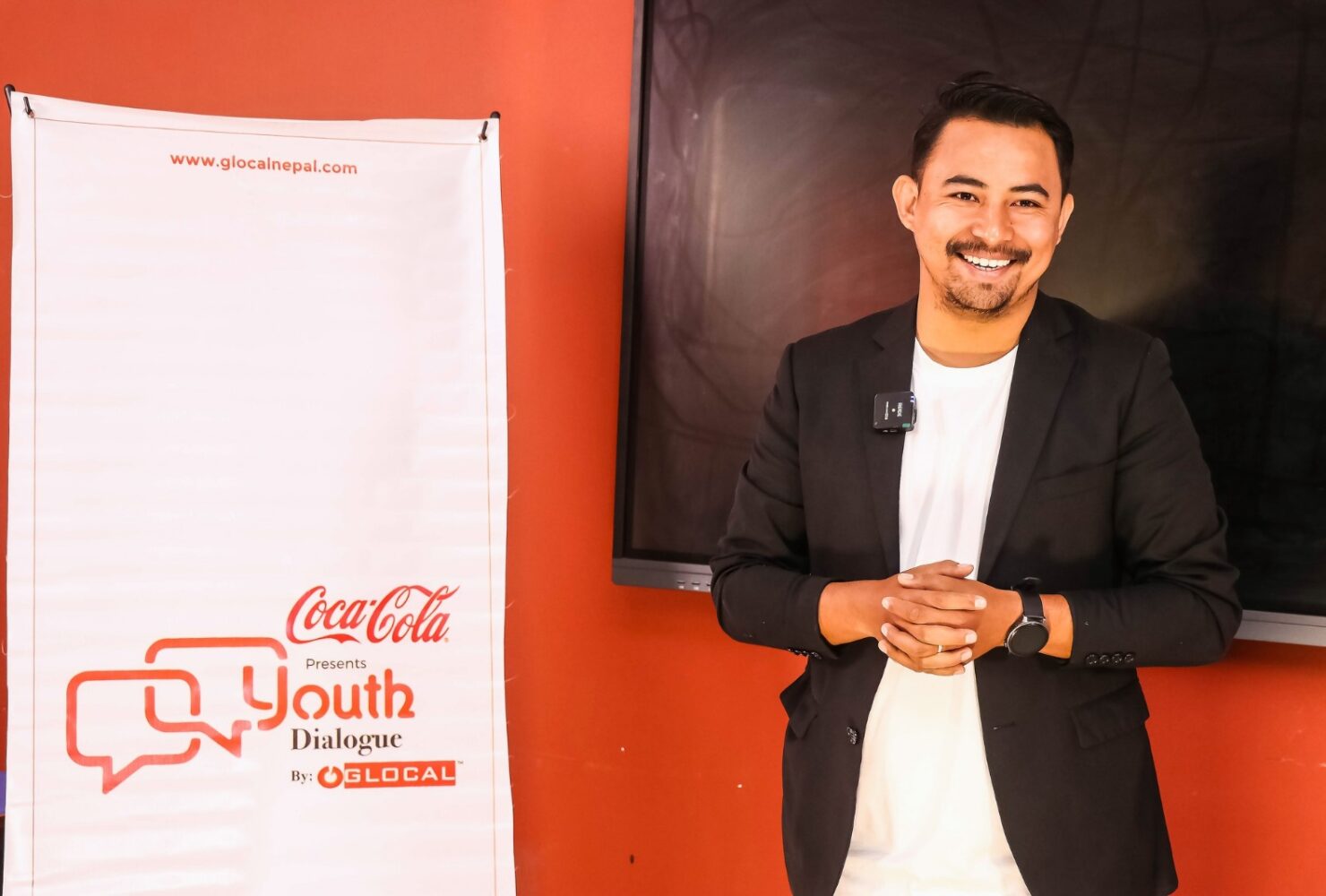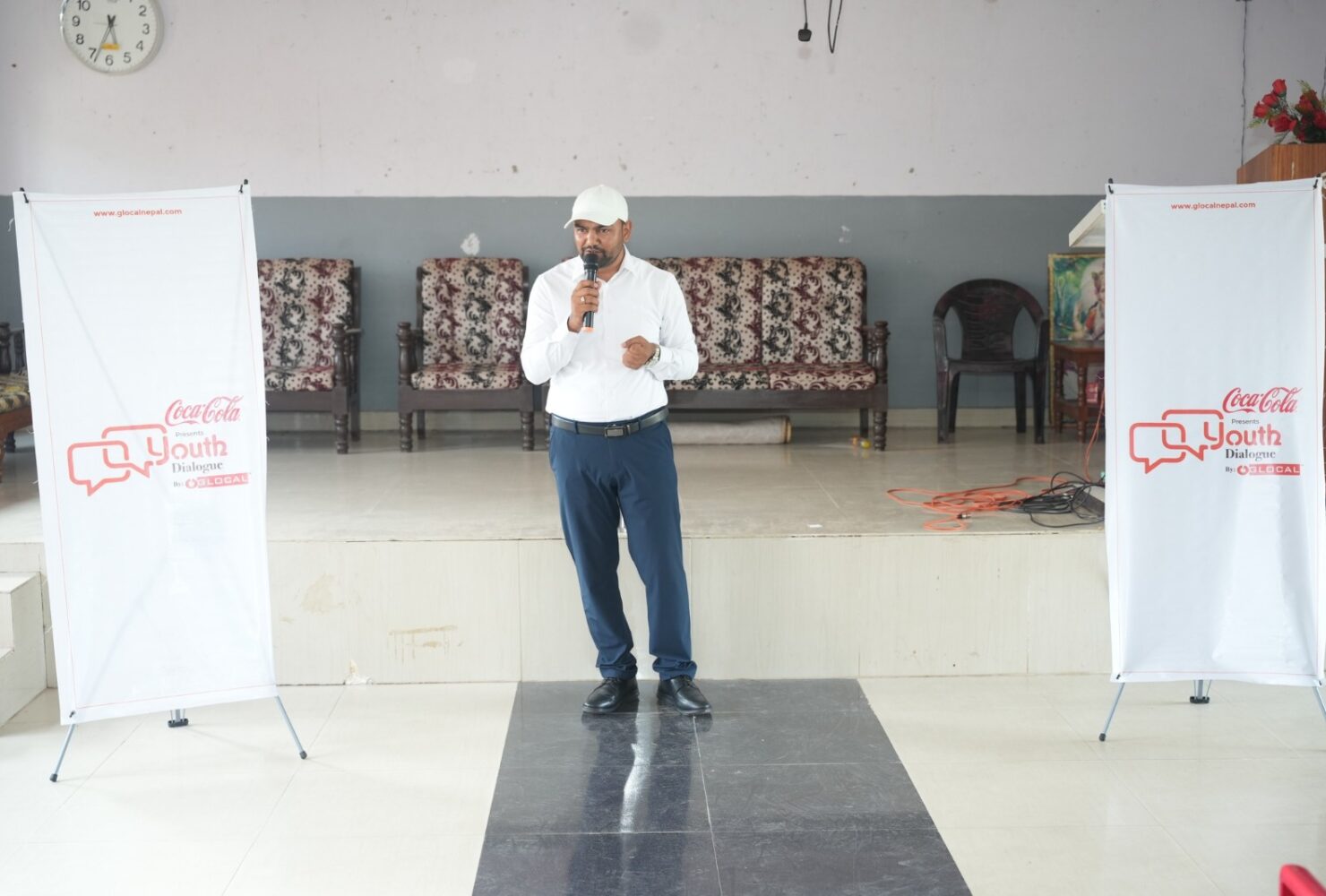This third-panel discussion of CEO Unplugged 2019 organized by Glocal Pvt. Ltd. was Practice of Skill Based Education. The panelist exchanged views on how Nepalese education lacks the practical curriculum and drew attention over the need for soft skills in youth to be employable in the market.
CEO Unplugged 2019 is a yearly forum organized by Glocal Pvt. Ltd. comprising series of a panel discussion to establish a forum to discuss contemporary business challenges, opportunities and futuristic view with a sight of experiential learning to the newcomers in the business and students with an objective “Today Meets Tomorrow“.
The third-panel discussion comprised of panelist; Saurabh Jyoti, the Director of Jyoti Group; Ms. Diptee Acharya, the Director of Sanskriti International School; Samir Thapa, CEO of Silver Mountain and moderator; Udgam Khadka, Education Designer at King’s College. Udgam Khadka interrogated these specialists about what skills do students require in this 21st century to make themselves sellable in the market today. He also asked them the possible roles and responsibilities of concerned stakeholders in developing an advanced and industry-centric curriculum for the students.

Diptee Acharya, the Director of Sanskriti International School
First of all, we need to understand what is education. Education is like a ship that takes you to the port. You want a beautiful life, a successful life. Where we go wrong is we are forgetting the fact that this is the 21st century. We are not taking people out to work in the factory. We need to know what is education and most people think that if you aspire a good academic background, it takes you to a successful life.
It’s more about critical thinking, communication, empathy, how to cope with stress, emotions, interpersonal skills. These are the soft skills that we are looking at. And that’s what WHO talks about, every child needs these skills to succeed in life. You can talk about critical thinking, you can talk about creativity, you can talk about decision making, problem-solving. So schools now, providing these skills, are you able to go and provide these skills to your students so that they can go and make themselves available in the market? So I think we should focus on those skills. Nepal is in an entire need of skilled based education in Nepal. What happens is the desire is low but the demand is high. So the learners, parents, society, they need to think that am I only read for the world because of my academic caliber? Or is it the soft skills that will take me to forward? So until and unless there is a small change in the mindset of the people, this is not going to change.

Of course, the government holds a big role here because they are the policymakers. If we see the statistic of how many people leave the country, we see that they are the lower start of people with fewer academics. So what we feel is if we have a higher degree, we are much higher in society. But we don’t think that skills are more important. Whenever we are making a curriculum, in my schools also, we have to think in a different manner. Before, we use to think about what kind of activities should we do so that our students can learn fractions. But now what we have to think is that is fraction really needed to develop resilience and perseverance in my students? Now we need more deep thinkers. We need thinkers who can think about what kind of jobs is needed in the market tomorrow. So, we need more deep thinkers. We need thinkers who can think about what kind of job is needed in the market tomorrow.
One thing that I want to add here is as Saurav said, we are in a digital era right now. Thing is changing so fast that you will be surprised in the next 5-10 years, AI is going to take over. Are you prepared for that and are you prepared for it? When we think about the AI Robots, oh they are going to come and they are going to rule over but that is not the case. What’s going to happen is we are going in hand in hand. So, we need to understand how we are going to have interpersonal skills with Robots with AI.
The lady in black asked about Rukum and we are really worried because it’s just 0.2 percent in Nepal who are studying in a private school, not even 2%. So can you imagine? 99.8% of people are lacking in the skill. They all have mobiles in their hands and the person is not educated, we can see the technologies are taking such lead. So it is going to take even more than we mark. Are we prepared for that? And now the government really has to focus on changing the curriculum and what our parents need to understand that we are not supposed to go behind our marks. If I ask my parents,” Will you let your child become a teacher?” “No!” Are you going to let your child become a carpenter?” “No!” You really need to change that mindset. Until and unless we don’t change our mindset from all of us, then change is not going to come. There is a big question mark there.
Saurabh Jyoti, Director of Jyoti Group
The first thing that struck me was the statistics of literacy rate. The data shows the literacy rate of Nepal around 65%. Is that good? Bad? I think it’s terrible. That data is absolutely correct but that data is absolutely wrong when it comes to the industrial perspective because if you have the literacy rate of 65%, the employability rate will be less than 80 percent. when it comes to them securing the jobs based on their academic qualification. So 68% fine! But what does it translate when they into the job market and they want to get the job? The MBA graduates can get a job of 200 $ instead of 6-700$ because the skills set don’t match. So you need to look employability relatively to the data. So what happens when I interview someone, I never look at their academic qualification. I look at how is the personality of the person. What are the soft skills he possesses? Those are more important.
And secondly, over 70-60% people I employ, I need to retrain them to integrate them in a specific job and responsibility that he has t look after. Be it the factory manager or whether it is in a top managerial position. So the time I need to reorient, retrain these people, is the loss of productivity. And I am sure, this is a similar case with every big company. So much time is wasted which is considered to be one of the most important resources. By losing that time, we are losing productivity. So that is something that is extremely worrying for me. What I feel is that there is a serious mismatch. Its like I am riding a motorbike, my glove’s size is medium and I am getting XXL size.

Therefore, this need to be matched, whether with the Education Ministry, PABSON so that we can directly employ the 68% people as the facts say. We have been talking with KU, KUSOM that there need to be a regular interaction academic institutions and the employers as sectors wise so that what skills are required for the students who graduate from them. At some level, on the individual basis, some companies are working with various institutions like KUSOM, ACE but that’s just a few. We need to do this on a national level. Not just in the private sector but at the government level because 90% of the students study in government schools and colleges. So at the mass level, government level, there must be coordination between employers and educational institution so that the rate of employability of the graduates is much higher.
Just pick an example, ah let’s say one of the motorcycle company, they prepare a hashtag with certain technology. That technology is invented in the market for quite a few times. It is the modern changes here and there if somebody gets skilled in that particular part and he can continue his career for a certain time. Let’s say, 10 years of time, 12 years of time then the new technologies come and the entire changes of technologies come, he gets chance to adapt into that because if you are skilled for one level, you have always an opportunity to next level. So, new technologies are based on the foundation right. There are no like rocket science technologies happening.
Samir Thapa, CEO of Silver Mountain
First of all, we need to understand that there are two types of education in the country. One that starts with class 1 to the university level that’s more of academic. Then we have the vocational education that offers by the CTEVT. If you see the number of schools, CTEVT has a large number of schools. But what we have seen is that there is a huge gap. The gap is, we all are in the race to promote and sell our degrees. Either in the better ways or in bad ways. We have to forget this race and come to the point that what our industries needed. The biggest challenge, the biggest gap, what we have seen is that our curriculum is not industry driven. This is the biggest challenge. All the academicians make very good curriculum add fancy values, they always think that this curriculum is sellable and will be recognized in all over the world. We have to stop this race and should understand what the industry requires. Our academicians, curriculum developers, from all the big universities of Nepal and individual colleges like us, we have to focus on developing industry-driven education.
In last 15 years, providing these vocational educations, what we have realized is that we started getting the people, we started awarding the people with different education level, but the biggest challenge what we have faced is that why our graduates are not getting jobs. This is the common scenario here. We have lots of people like you who have got a bachelor’s and a master’s degree. But when they go to the industries, why you are not accepted. The reason is you are not skilled. We don’t have a lack of degrees over here, an MBA degree or bachelor’s degree doesn’t teach you how to handle a telephone. Only the skills training does that. This is the biggest gap what we have seen. We had a long discussion with all stakeholders of Nepal and abroad. What they need is that they need someone who can just jump on their chair, understand the overall intentions, get the orientations, adapt the situation and run the responsibility. How to perform the job is more important to the employer than to know what degree you have.

I want to ask the students over here, what will you do to your degree after 5 years? After graduation, you keep it on the wall and after 5 years, you forgot, After some point of time, you will throw that piece of paper in the cupboard or places like that. What actually is recognized is the skills that you have. We have to think in a different way. No parents want their children to be a carpenter and has a certificate of 6 months. As a carpenter also, he wants to see his children with the degree of bachelors. That’s the mindset that we have got. It has to be changed in a policy. Like in foreign countries, there are vocational degrees like there are academic degrees here. Once the person reaches a certain level of the vocational training there is the outlet for him that he can jump for the academic program and get awarded with the degree. But this is not happening in Nepal. But lately, the Government of Nepal has come up with an entity named NVQS (Nepal Vocational Qualifications Standard). I hope this policy will be passed by Nepal government as soon as possible, so that the people who have got the skills to go in the vocational training, can get their bachelors degree, they don’t have to drop their skills.
Audience Question
There are places like Rukum where students are still struggling for basic education due to lack of schools and teachers. So, how can we ensure the overall educational development of these people?
On the other hand, is education and skill gone really expensive? I mean the monthly fees of the educational institution are really high and it is like rising day by day. But the economy of the parents has not raised. The next question is, there are so many institutes that have been giving skills and again they are so expensive. For example, I was looking for a camp for my litter sister who is in class nine and for 3 days, it costs around 7-8 thousand rupees. So, does that also impact on not having skills? Likewise, in our country, there are lots of children who do not pursue higher education because their parents cannot afford. So, do you think there should be a mechanism of providing an equal amount of quality in all these institutes despite the money these parents can afford?
Saurabh Jyoti: Thank you for the question. Technologies have made the process of education much easier. If you see, most people have smartphones in their hand. So, now geography doesn’t matter if you use these technologies to access education. You can learn anywhere, anytime with best the teachers all around the world.
The cost of education depends on intellectual education and practical education. Intellectual education always cost high. The reason is it is always based on research. Either the research happens for the 1 class kids or the research is happening for the master level students. Because intellectual work is going on there. The practical work which is base for the skill that lasts for a long time. The changes for the practical remains for some time. We have to understand one thing. As an educator, as a researcher or an academician you know we need industry we need terms of business. We need a good practice in any kind of business. So, these people need us so education must follow the industry and service to education and the services. Once the process is into the system that we follow them then we segregate the intellectual education and practical educations. So you cannot stop the cost of intellectual educations because of its individual’s efforts and individual research to get the outcome of that particular educations.
Conclusion
The final panel discussion emphasized the need for practical educations and skills to make students employable in the market. It also highlighted the need for the upgraded curriculum to ensure quality education in Nepal.





